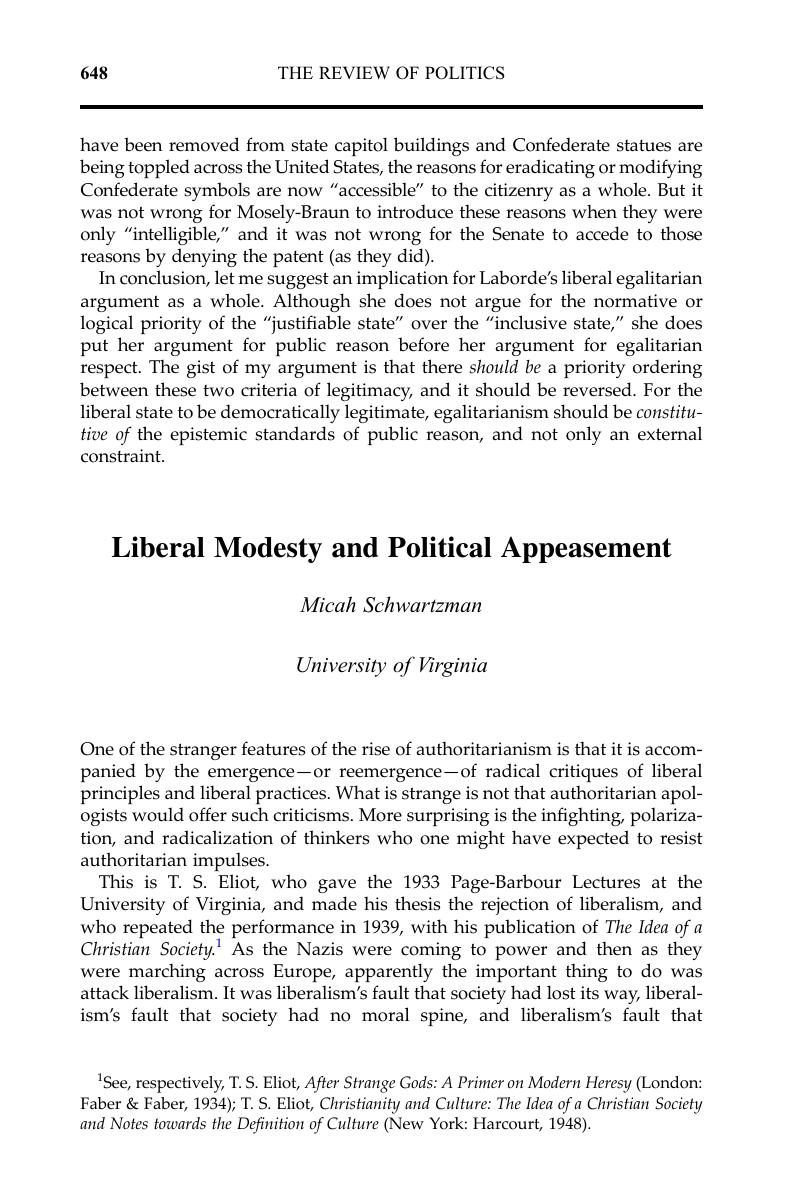No CrossRef data available.
Published online by Cambridge University Press: 11 September 2019

1 See, respectively, Eliot, T. S., After Strange Gods: A Primer on Modern Heresy (London: Faber & Faber, 1934)Google Scholar; Eliot, T. S., Christianity and Culture: The Idea of a Christian Society and Notes towards the Definition of Culture (New York: Harcourt, 1948)Google Scholar.
2 Smith, Steven D., Pagans and Christians in the City: Culture Wars from the Tiber to the Potomac (Grand Rapids, MI: Eerdmans, 2018)Google Scholar. See also Reno, R. R., Resurrecting the Idea of a Christian Society (Washington, DC: Regnery, 2016)Google Scholar. For a response to Smith (and to Eliot), see Schragger, Richard and Schwartzman, Micah, “Jews, Not Pagans,” San Diego Law Review 56 (2019): 497–520Google Scholar.
3 See, e.g., Adrian Vermeule, “Integration from Within,” American Affairs (Spring 2018), https://americanaffairsjournal.org/2018/02/integration-from-within/; Adrian Vermeule, “A Christian Strategy,” First Things (Nov. 2017), https://www.firstthings.com/article/2017/11/a-christian-strategy; Adrian Vermeule, “Liturgy of Liberalism,” First Things (Jan. 2017), https://www.firstthings.com/article/2017/01/liturgy-of-liberalism.
4 Cécile Laborde, “Three Cheers for Liberal Modesty,” Critical Review of International Social and Political Philosophy (2018), doi:10.1080/13698230.2018.1487228.
5 See Rawls, John, Political Liberalism (New York: Columbia University Press, 1992)Google Scholar; Quong, Jonathan, Liberalism without Perfection (Oxford: Oxford University Press, 2011)Google Scholar.
6 See May, Simon Căbulea, “Religious Democracy and the Liberal Principle of Legitimacy,” Philosophy & Public Affairs 37 (2009): 139–42CrossRefGoogle Scholar.
7 See Klarman, Michael J., From Jim Crow to Civil Rights: The Supreme Court and the Struggle for Racial Equality (Oxford: Oxford University Press, 2004), 312–20Google Scholar, 408–21.
8 See, e.g., Melling, Louise, “Religious Refusals to Public Accommodation Laws: Four Reasons to Say No,” Harvard Journal of Law & Gender 38 (2015): 185–88Google Scholar.
9 See Sepper, Elizabeth, “Doctoring Discrimination in the Same-Sex Marriage Debates,” Indiana Law Journal 89 (2014): 752–56Google Scholar; NeJaime, Douglas and Siegel, Reva B., “Conscience Wars: Complicity-Based Conscience Claims in Religion and Politics,” Yale Law Journal 124 (2015): 2552–65Google Scholar.